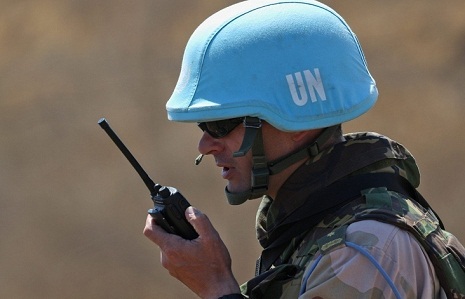“Whether there is a need for a fully fledged UN peacekeeping operation, that is something not for now, because it would take a lot of time to establish that,” Germany`s Permanent Representative to the OSCE Rudiger Ludeking stated on Tuesday.
“What we need to do… is to make the current system work,” he added, referring to the OSCE SMM mission.
Ludeking was responding to Ukrainian ambassador to the United States Olexsander Motsyk’s proposal at the OSCE Security Days conference that the UN and EU deploy a peacekeeping mission “to ensure the implementation of the Minsk agreement.”
On Monday, Ukrainian President Petro Poroshenko had submitted a proposal to the Ukrainian Parliament to make an appeal to the UN Security Council and the Council of the European Union for an international operation to maintain peace and security in Ukraine.
The German approach to the mission in Ukraine is “practical and pragmatic,” the German ambassador noted. He added that everything must be done to enable the SMM to accomplish the tasks of monitoring the ceasefire and overseeing the withdrawal of heavy weaponry from the conflict zone.
“What is important is that we strengthen, at this juncture, the Special Monitoring Mission,” Ludeking stated.
US President Barack Obama’s special assistant and National Security Council advisor on Russia and Central Asia, Celeste Wallander, agreed with the German ambassador’s position.
“We similarly take a pragmatic approach. We would like to see the mission that is already funded, experienced and with the right mandate…be able to do its job,” Wallander said of the SMM.
Wallander added that allowing the SMM to do its job “would be a big step forward,” because it would allow for the “step by step implementation of all of Minsk.”
On the possibility of a UN or European Union peacekeeping mission in the future, Wallander noted, “We [the United States] are open to options.”
Russian ambassador to the United States Sergei Kislyak responded to Wallander stating that his support for allowing the SMM to complete its mission is “one of the rare occasions on which we agree.”
Kislyak also argued that the participants in the Minsk process and OSCE members need to “give the OSCE a chance to work,” and give it “the power to implement the Minsk agreements.”
Under the February 2015 Minsk Agreements, the OSCE mission in Ukraine has been entrusted to oversee the Ukrainian ceasefire and the withdrawal of heavy weapons. The 57-nation OSCE Council recently agreed unanimously to extend and provide funding and other resources for the SMM for an additional twelve months.
More about:
















































